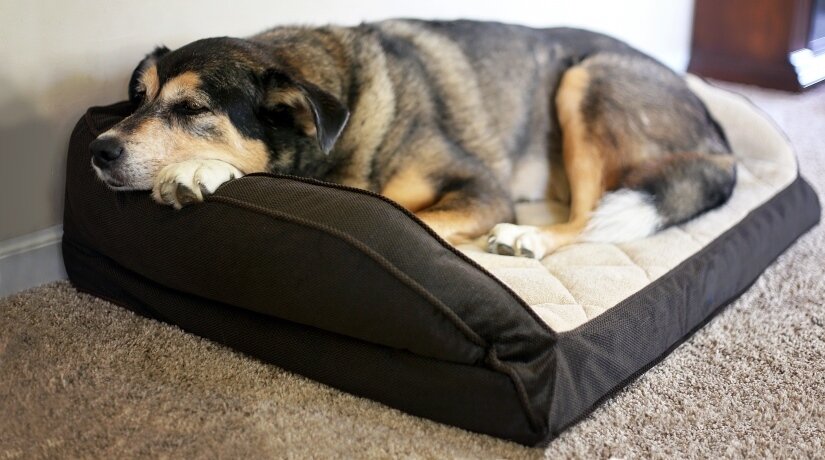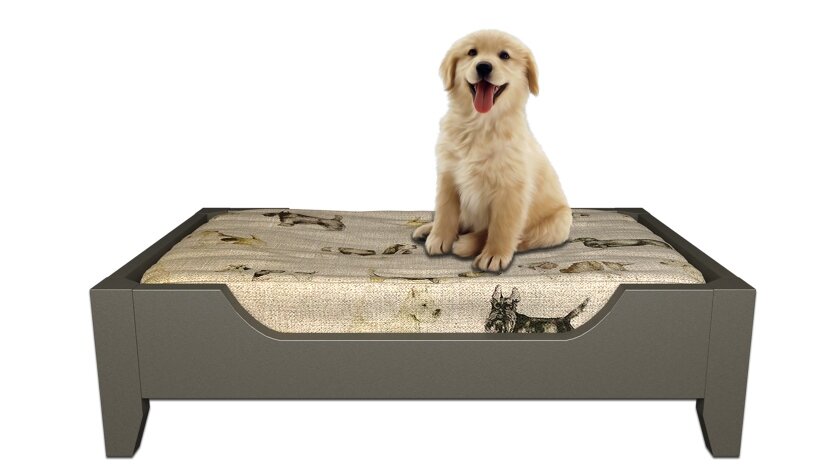Essays by Ms. Katya C. Samano
I often find myself staring at my husky-lab mix in awe as he closes his beady eyes to fall asleep. He lays in his bed which is tucked inside his kennel. Contrary to my sister’s boxer, who sounds like she is being murdered when put in a cage, I can tell my dog considers his kennel a place of safety. I often refer to it as his room. Yet, more often than not, he gets out of the kennel to sleep either on the floor or on my bed. Although I adore him, as many husky owners have the luxury of knowing, the infinite amount of hair can drive you mad, it will quite literally consume you if left unattended for several days. It was not until I started researching about dog beds that I began to take notice that my dog is no longer a puppy, the dog that ran regional track practices with me has now been replaced with a dog who enjoys his long walks but will sleep for the other 90% of the day. His transition to older age might be met with bone and muscle wear as many dogs unfortunately do, this is why as dog owners, it is crucial to provide your pet with the appropriate bed to help alleviate and slow the progress of the inevitable consequences of ageing which are osteoporosis, hip dysplasia, among other things. One simple way of helping your pet is by choosing the correct bedding for their needs.
We are unfortunately forced to watch our beloved pets age and become less energetic and spend more time sleeping than playing around. A culprit for this could be arthritis and joint pain. Arthritis is an inflammation of the joints which causes joint discomfort, pain and stiffness. It is linked to bone friction, all of the bone to bone contact and rubbing causes arthritis and build up of bone tissue¹ which can lead to extreme joint problems in older dogs, both small and large dogs are susceptible to this. Although there are breeds that are more likely to develop joint issues due to their genetic makeup, this is true for chihuahuas, German shepherds and Mastiffs. Many big older dogs are met with bone displacement issues meaning their bones are likely to dislocate and lead to major invasive surgery.
According to the National Sleep Foundation, the average dog sleeps between 12 and 14 hours per 24-hour cycle. Just like us, over time their bones and joints begin to wear down with age, all of that time on the bed is crucial for their bone and joint health. Many mass-produced dog beds are simply cloth stuffed cushions, which, if slept on, the dog’s body does not get the support they need. Non-orthopaedic dog beds are typically made with egg-crate foam, foam chips, polyester fiber and medical-grade hospital foam², this material leads to pets dipping into the hard floor or crate beneath them and puts strain on the dog’s bone and joints. According to a study in the Journal of Veterinary Behavior, in a sample of 12 dogs, the preliminary choice for the dogs was the softer bedding. This was especially true with older dogs, the softer bedding that was more readily accessible to them was used almost 40 times as much throughout their regular sleep cycle³. This could be because, according to Underdog pet products, 30-40% of dogs develop Osteoarthritis throughout their lifetime⁵. Osteoarthritis can be triggered by several factors like weight, genetics, stress, exercise among others. Many of us have had the unfortunate opportunity of experiencing muscle pain as a result of poor bedding, whether at a friends house or hotel rooms, the morning after brings the undeniable back pain that can take several days to subside. Dogs spend the majority of their day taking naps therefore it is especially important to make sure that the bedding will give them the support needed for their joints. Orthopaedic dog beds allow for a more even distribution of weight throughout the bedding giving support to joints and muscles. More support means extra blood flow that provides more oxygenation to local tissue cells. This decreases the side effects that come with osteoporosis like joint pain and hip dysplasia².

Unlike just regular foam, orthopaedic beds that specialize in osteoporosis relief have a cooling mechanism that allows the dogs to not overheat with the material. As seen, dogs will move from the bedding area to hardwood floors or areas where it is cooler when overheating from the bedding. This again puts strain on the dogs as the floor is not at all supportive compared to beds. A cooling material allows for dogs to remain in their bed throughout the entirety of their sleep, as dogs like to move around if their body starts producing too much heat⁴. Cooling material keeps the moving around to a minimum.
According to Wtop News a survey conducted stated that about 71% of pet owners sleep with their pets⁵. Human grade foam undoubtedly will give pets good support but an overlooked consequence is the space, or lack thereof. In the blog iheartdogs it details a study conducted by Eric Shannon, the founder of Big Barker where he tested how size and material affected the sleep of his two large dogs. Using Tactilus pressure mapping sensor technology, he was able to map out how different bed material supported their weight and where there was very little joint support. His results indicated that “polyfill and China-made memory foam beds provided little to no support…showing significant amounts of pressure.” with the sensor showing a consistent glow of equal support of weight with the bed produced by Shannon which was made of true memory foam and had enough thickness to hold the weight of a 90 pound dog⁶. Veterinarian, Dr. Wooten, advocated for the importance of beds that provide this type of support for older dogs with bone problems, he states “The worst outcome from improper bedding for a dog could be exacerbation of inflammation and pain from arthritis in joints, resulting in loss of mobility,” And that “Improper bedding could also result in increased incidences of painful skin conditions, including pressure sores, decubital ulcers and pressure point pyodermas.”⁶ Shannons bed appears to be so successful at joint relief because of the memory foam used, there are three layers that each give support as opposed to regular polyester filling. As well as the sizing of the bed, his bed gave ample space for the dog to lay on. Not one part of their body was more supported than the other because of how big the bedding is⁶. Which makes you think, maybe that is why so many of our pets have the tendency to climb into the bed with us despite having a bed of their own. Human beds have everything stated above, memory foam and space. Can we possibly blame our dogs for wanting a bed that alleviates their joint issues and is all around more comfortable for them?
Sometimes it’s hard to find the balance between comfortable and long-lasting if you have dogs that are not crate trained or have separation issues that trigger, for lack of a better word, destruction. Although we have established that orthopaedic dog beds are overall better for dogs, it is still hard to drop the money for one if your dog is likely to tear it apart. Taking apart the bed would make it lose its purpose of maintaining good joint support. For that, chew-proof beds are widely used for animals that have the tendency to tear at beds. Dogs of all ages require good bedding and according to GorillaDogBeds, when looking for a chew proof bed, it is detrimental to make sure that the material in which the bed is made consists of non-toxic materials⁷. We know all too well that veterinarian bills are no friends to our wallets, getting a chew proof bed could also prevent a costly trip to the vet.
Making sure that your dog lives a comfortable life is one of the most important aspects of being a dog owner. The impact of your dog’s bed is undoubtedly detrimental to your dogs health as the years go by and they start showing their age. I think many of us do not take in consideration how much simply changing our pets bed can make to their life and comfortability. Some of the signs that it is time for a new bed is when they spend less time on it and when you see the bed worn and divot into the flooring or simply when your dog starts showing signs of age like slowing down and sleeping more than usual⁶. It is important to research beds that are specifically designed for whatever it is your dog may need, whether they struggle with chewing beds, to joint problems, how big they are and of course how much they weigh. I think we can all agree that dogs become part of the family and manage to steal the hearts of even the dads who originally said no to getting a family pet. As their owners and humans making their few years of life the most comfortable and painless is a huge part of our responsibility therefore it is important to stay informed on topics such as how to help out our dogs when their health is involved.
Bibliography
- “Arthritis in Dogs.” The Kennel Club. Accessed November 25, 2020. https://www.thekennelclub.org.uk/health-and-dog-care/health/health-and-care/a-z-of-health-and-care-issues/arthritis/
- Wisner, Lowell, Author: Lowell Wisner, and Author: “White Paper: Rest, Relief and Recovery: The Science Behind Therapeutic Dog Bed Technology.” UnderDog Pet Products, March 20, 2020. https://underdogpetproducts.com/2020/03/20/the-science-behind-therapeutic-dogs-bed-technology/
- Döring, Dorothea, Ilona Backofen, Jörg Schmidt, Alexander Bauer, and Michael H. Erhard. “Use of Beds by Laboratory Beagles.” Journal of Veterinary Behavior. Elsevier, July 18, 2018. https://www.sciencedirect.com/science/article/abs/pii/S1558787817302125
- SitStay. “How An Orthopedic Dog Bed Can Help Arthritis In Dogs.” SitStay. Accessed November 25, 2020. https://sitstay.com/blogs/good-dog-blog/orthopedic-dog-bed-for-arthritis-in-dogs
- “How Many People Sleep with Their Pets?” WTOP, March 7, 2014. https://wtop.com/news/2014/03/how-many-people-sleep-with-their-pets/
- Lotz, Kristina. “Could Your Dog’s Bed Be Causing Joint Pain? Here’s How To Tell.” iHeartDogs.com, May 3, 2016. https://iheartdogs.com/could-your-dogs-bed-be-causing-joint-pain-heres-how-to-tell/
- Paigepesko. “Benefits of Chew Proof Dog Beds.” Indestructible Dog Bed: Best Chew Proof Dog Bed | Gorilla Dog Beds®, March 31, 2020https://gorilladogbeds.com/benefits-of-chew-proof-dog-beds/
